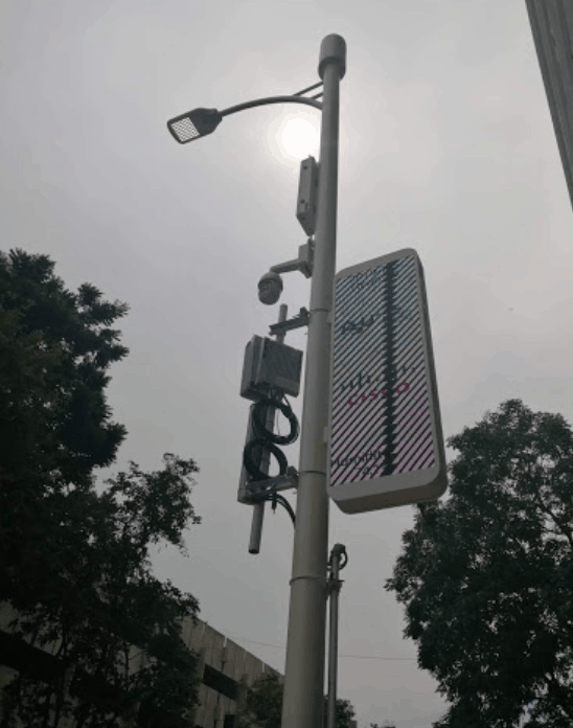The development of the smart city is an ongoing trend all over the world. Many cities are investing in new technologies to make their infrastructure more efficient and to improve the quality of life for their citizens. One of the most visible signs of a city evolving into a smart city is the presence of a smart pole. Smart poles are street lights that have been outfitted with a variety of sensors and devices that collect data and provide information to the city. They can be used for a variety of purposes, from monitoring traffic to providing WiFi access to tracking air pollution. In this blog post, we will explore the role of smart poles in the development of smart cities. We will discuss how they are being used in cities around the world and what benefits they provide. We will also touch on some of the challenges associated with their deployment.
What are Smart Poles?
Smart Poles are one of the foremost pieces of evidence that the city is evolving into a smart city. They are street lights that are equipped with a variety of sensors and devices that can collect data about the environment, traffic, and weather conditions. This data can be used to improve the efficiency of city services and to make the city more sustainable.
What are the benefits of Smart Poles?
The benefits of Smart Poles include:
- Improved city services: The data collected by Smart Poles can be used to improve the efficiency of city services. For example, the data can be used to optimize traffic flow and to reduce emissions from vehicles.
- Enhanced sustainability: The data collected by Smart Poles can be used to make the city more sustainable. For example, the data can be used to identify areas where there is a high demand for energy, so that renewable energy sources can be deployed in those areas.
- Improved public safety: The data collected by Smart Poles can be used to improve public safety. For example, the data can be used to monitor air quality and to detect fires.
How do Smart Poles Benefit Cities?
Smart poles are one of the key infrastructure components that enable cities to become smart cities. Smart poles are equipped with a variety of sensors and devices that can collect data about the environment, traffic, and weather conditions. This data can be used to improve city planning, traffic management, and emergency response.
Smart poles also provide a platform for other smart city applications such as public Wi-Fi, air quality monitoring, and wayfinding. They can also be used to support electric vehicle charging and power grid management. By providing these services, smart poles help make cities more liveable, sustainable, and efficient.
What is the Future of Smart Poles?
The future of smart poles is very promising. With the rapid development of technology, more and more cities are starting to adopt smart city technologies to improve their efficiency and livability. Smart poles are one of the most visible manifestations of this trend.
As cities continue to grow and become more densely populated, the need for efficient and reliable infrastructure becomes even more critical. Smart poles can help cities meet these challenges by providing a platform for a variety of services such as lighting, WiFi, environmental monitoring, and security cameras.
What’s more, smart poles are just the beginning. In the future, we can expect to see even more smart city infrastructure including intelligent traffic systems, self-driving cars, and much more. This is an exciting time to be alive and witness the transformation of our cities into truly smart places!
How Can I Get Involved with Smart Poles?
There are many ways to get involved with smart poles. One way is to research and develop new technology for smart poles. This can be done through government grants or private sector investment. Another way to get involved is to install and maintain smart poles. This can be done through a variety of companies that offer this service. Finally, you can also advocate for the use of smart poles in your city or town. This can be done by contacting your local representatives and letting them know why you think smart poles would benefit your community.
What Are the Benefits of Smart Poles?
There are many benefits to smart poles. One benefit is that they can help to reduce light pollution. Light pollution is a growing problem in many cities and towns across the globe. Smart poles can help to reduce this problem by using LED lights that emit less light pollution than traditional streetlights. Additionally, smart poles can also help to reduce energy consumption. This is because they use less electricity than traditional streetlights. Finally, smart poles can also help to improve public safety. This is because they can be equipped with a variety of security features, such as cameras and alarms.
Conclusion
Smart Poles are just one example of how cities are evolving into smart cities. By collecting and analyzing data, Smart Poles help city officials make informed decisions about everything from traffic flow to emergency response times. In the near future, we can expect to see even more evidence of this evolution as more and more cities around the world begin to adopt similar technologies.
What do you think about Smart Poles? Do you think they are a necessary part of the evolution of the smart city? Let us know in the comments below!

